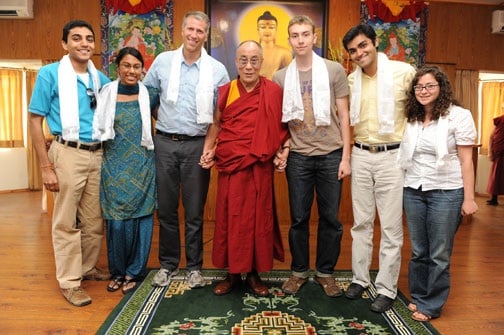Roman Catholic Priests are the surprising voices of clarity and conviction in Michael Moore’s new film Capitalism: A Love Story. The Priests in this documentary, one of whom married Mr. Moore and his wife, aren’t ambivalent – they characterize capitalism as evil. This must be jarring for most moviegoers who have not had the pleasure of interacting with radical priests who, unfortunately, seem to be something of a dying breed these days. Most of us are used to the recent steady stream of religious voices praising our free market system as part of God’s plan for prosperity. In Moore’s opinion we have been hypnotized to believe that capitalism and Christianity must go hand in hand.
In one of the funnier segments of the film, Moore adapts one of the early Jesus movies by dubbing over foundational teachings of Jesus such as “You cannot worship God and wealth” (Luke 16:13); “Blessed are the poor and woe to the rich”(Luke 6); Let the oppressed go free (Luke 4), and changing them to pithy endorsements of such stock capitalist principles such as the profit motive. One immediate classic is the scene of Jesus refusing to heal the sick man because of what this new improved capitalist Jesus describes as his “pre-existing condition.”
While the views of the priests in this film may seem strange to some, Christians have been questioning Capitalism’s ethical compatibility with Jesus since the effects on the poor of capitalism and industrialization became tragically clear in the 1850’s. Many of us who are above thirty-five will remember the WWJD (What Would Jesus Do) movement among Evangelical churches in the 1980’s and 90’s. Seen from the outside, WWJD seemed a laughable effort to improve individualistic Christian morality. However the history of WWJD dates back a century before when Charles Sheldon wrote the Christian novel “In His Steps,” which asked the question What Would Jesus Do to an American society rife with social inequalities and ills due in part to the rise of industrialization and the capitalist exploitation of the poor by the wealthy. While the book has undeniably patronizing tones, it compellingly tells the story of a prosperous church whose members respond to the challenge of living their life by the question: What Would Jesus Do? The characters in the book include a business man who decides to make his factory a cooperative, a tenement owner who repents of his policy of neglect towards his tenants, and a heiress who gives up her fortune to give housing and religious instruction to the poor women of the slums.
The priests in Michael Moore’s film are part of an even more radical tradition that includes Father Edward McGlynn from the 1890’s, as well as more recent Catholics such as Gustavo Gutierrez and others shaped by liberation theology and its socialist economic principles. My great grandfather Walter Rauschenbusch, was a Baptist pastor who, while never a socialist, was sympathetic to the Christian Socialist tradition. He wrote this remarkably piece in 1908 which seems as though it could be written today:
In the same way we shall have to see through the fictions of capitalism. We are assured that the poor are poor through their own fault; that rent and profits are the just dues of foresight and ability; that the immigrants are the cause of corruption in our daily politics; that we cannot compete with foreign countries unless our working class will descend to the wages abroad. These are all very plausible assertions but they are lies dressed up in truth. There is a great deal of conscious lying. Industrialism as a whole sends out deceptive prospectuses just like the single corporations within it. But in the main these misleading theories are the complacent self-deception of those who profit by present conditions and are loath to believe that their life is working harm.
– Christianity and the Social Crisis
Moore’s film isn’t clear what system he is suggesting to replace capitalism. Instead of socialism he suggests democracy (a system of governance for which an editor from the Wall Street Journal has stated his distaste earlier in the film.) But does democracy cover it? Moore promotes small, self owned cooperative businesses, safeguarded by a supportive government that provides for the basic needs (rights) of the population. But Mr. Moore’s answer to the problem of capitalism is never completely clear. He seems happy with leaving it to the democratic process to come up with the solutions.
The real value of the film Capitalism: A Love Story is that Mr. Moore turns the spotlight on places in America of suffering and degradation that we would rather ignore. Some of the scenes of eviction are too painful to watch and your heart aches for the people in their struggles. This is where the true Christian message finds its most potent voice as it is in those very struggles where we find Christ, and it is in those places that Christians must serve. Jesus is not in the houses of the wealthy and the comfortable, he is in the suffering cries and crisis of the poor. If the church should be anywhere, it is there proclaiming release to the captives and redemption of the oppressed.
In one of the most poignant moments of the film the Bishop of Chicago joins the workers who refuse to leave their factory until they are paid what they are due and treated with dignity. As he serves them communion, the Bishop says to the gathered people – ‘we will not leave you, you are not alone.’
Just what Jesus would do.

